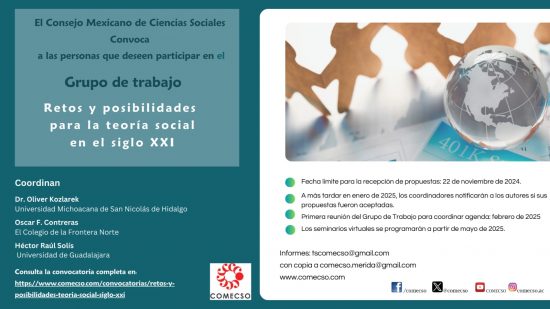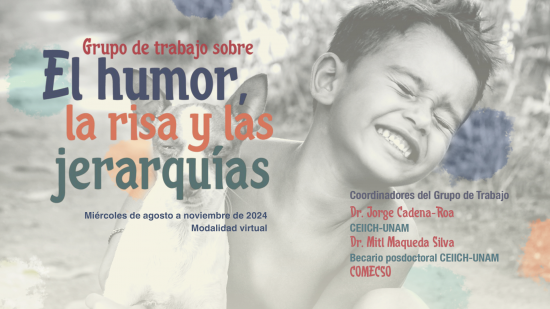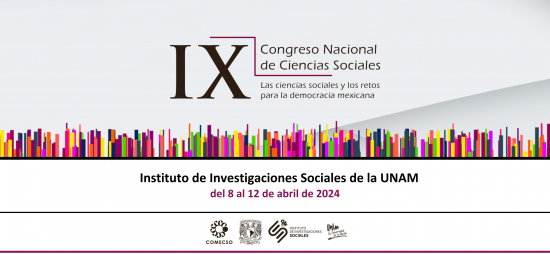Organizations in a plural Society
Call for Abstracts
Organizations in a Plural Society
International Conference on Organizational Sociology
Trondheim, December 8/9, 2022
Deadline for submission of abstracts is June 15, 2022
https://www.icos2022.com/call-for-abstracts/
Joint conference by
- “Organization & Society” Research Group at the Department of Sociology and Political Science, NTNU Trondheim ntnu.edu/iss/organization-and-society
- Research Committee 17 “Sociology of Organization” of the International Sociological Association
- www.organizational-sociology.com
- Section on Organizational Sociology of the German Sociological Association www.organisations-soziologie.de
Organizers:
Nadine Arnold (VU Amsterdam, The Netherlands)
Cristina Besio (HSU Hamburg, Germany)
Michael Grothe-Hammer (NTNU Trondheim, Norway)
Uli Meyer (JKU Linz, Austria)
Kurt Rachlitz (NTNU Trondheim, Norway)
Our society is characterized by an ever-expanding number of organizations and organizational forms – a “hyper-organization” so to say (Bromley & Meyer 2015). Without doubt, organizations have a significant impact on the development of society. They have conquered nearly all areas of social life and new organizational forms nowadays diffuse even into areas which traditionally were coordinated in an informal and community-based manner (e.g., childcare, housekeeping, personal assessments and career advice, hunting, weddings, and funerals). This conference aims at disentangling the relation and mutual influence between the manifold forms of organization and a plural society. In particular, we focus on the entanglement of organizations with heterogeneous expectations.
Organizations are usually faced with a myriad of expectations by numerous groups, individuals, and systems. Such expectations stem from a plurality of societal areas ranging from micro to macro and from local to global. They include moral, ethical, political, and environmental concerns (Hoffman 2001; Roth & Valentinov 2020) as well as macro-level values and norms attributable to differing “value spheres” (Weber 2009), “institutional logics” (Friedland & Alford 1991), “orders of worth” (Boltanski & Thévenot 1999), “function systems” (Luhmann 1994), and more.
Many of these expectations tend to be competing or contradictory and, accordingly, scholars have observed that heterogeneous requests often lead to conflicts (e.g. Battilana & Dorado 2010; Kraatz & Block 2010; Ocasio & Radoynovska 2016; Pache & Santos 2010, 2013). Nevertheless, organizations are usually quite successful in coping with these demands on a day-to-day basis (Besio & Meyer 2014; Binder 2007; McPherson & Sauder 2013). Moreover, organizations are not only coping with such societal demands; they are also crucial in shaping and enacting these as well (Will et al. 2018). However, we still know surprisingly little about the impact of their internal solutions on broader societal contexts and co-shaping societal trends (Apelt et al. 2017).
In the handling of heterogeneous expectations, new organizational forms play a central role (Brès et al., 2018). These are often constitutional hybrids (Alexius & Furusten 2019) which are capable of orchestrating different societal requests and respond to broader societal developments such as digitalization, global health crises or climate change. In the past, Max Weber (1976) identified bureaucracies as crucial for the emergence and maintenance of rational-legal authority, which is a core characteristic of modern society. But how is society affected by the current decline of large bureaucratic organizations (Davis 2015) and the rise of new and unconventional organizational forms? And what role do the remaining conventional forms of organization still play in context of these developments (du Gay & Vikkelsø 2016)?
Considering that on the one hand organizations actively shape specific meanings of combined expectations (e.g., through advisory and lobbying activities), while on the other hand they mediate different requests in their everyday activities, formal structures and projects, we might ask:
- How do organizations combine different domains and rationalities (e.g., moral missions and economic demands) and what are the societal implications?
- How can organizations innovate and become drivers of new expectations in organizational fields and broader social contexts?
- In which ways do organizations shape new grand challenges such as digitalization, global health crises, large-scale disasters, or climate change and vice versa?
- How do macro-societal pluralities spawn new organizational forms, structures, and processes, and what impact do these new aspects of organization have in turn on society?
We invite papers that address these or similar questions revolving around the role and relevance of organizations in and for our plural society. The conference will take place at NTNU in Trondheim, Norway, December 8-9, 2022. Please submit an abstract of 2-3 pages to icos.submission@gmail.com by June 15, 2022. Decisions on acceptance will be made until the end of July.
This conference is a joint conference of the “Organization & Society” Research Group of the Department of Sociology and Political Science at the Norwegian University of Science and Technology (NTNU), the Section on Organizational Sociology of the German Sociological Association (DGS) and the Research Committee on Sociology of Organization (RC17) of the International Sociological Association (ISA). Participation at the conference is free including food and beverages during the sessions and breaks. We will also offer a range of social activities including a visit of Trondheim’s magical Christmas Market.
We greatly appreciate you being or becoming a member of either the ISA Research Committee «Sociology of Organization» and/or the German Section on Organizational Sociology. Without our members we would not be able to organize conferences such as this.
Te puede interesar
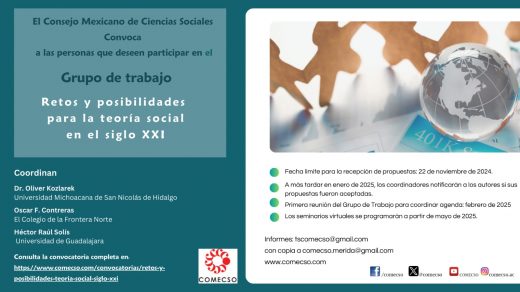
Retos y posibilidades para la teoría social en el siglo XXI
comecso - Nov 20, 2024El Consejo Mexicano de Ciencias Sociales, A.C. Convoca a las personas que deseen participar en el Grupo de Trabajo Retos…
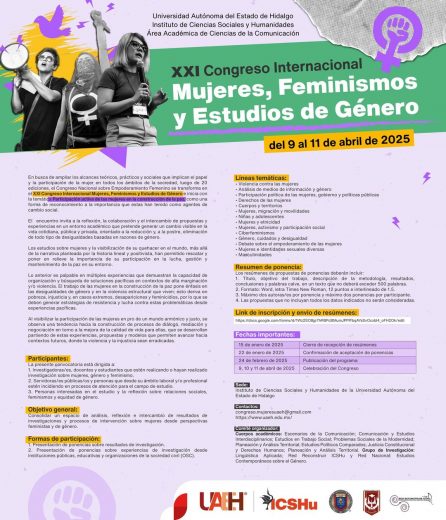
XXI Congreso Internacional Mujeres, Feminismos y Estudios de Género
Laura Gutiérrez - Nov 21, 2024Universidad Autónoma del Estado de Hidalgo, Instituto de Ciencias Sociales y Humanidades, Área Académica de Ciencias de la Comunicación XXI…

XIII Premio Iberoamericano en Ciencias Sociales
Laura Gutiérrez - Nov 20, 2024Con el objetivo de promover y fomentar el desarrollo de las Ciencias Sociales en el ámbito iberoamericano, así como la…



